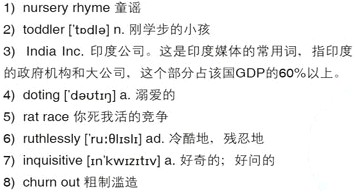看罢中国小孩子的“凄惨生活”,你先别忙着叹气,这个世界上人的差别其实并不大。那年在尼泊尔旅游,小编不经意间看到“补课”的小广告,再稍留意,才发现,这种小广告到处都是。敢情这补课也讲究“接轨”啊。其实,不仅仅是补课,就连“不要输在起跑线上”也不是中国特色呢。
这段印度人讲的英语,一开始听起来会很费力。要注意几点:一是印式英语总体上来说发音与英式英语更近,特别是元音;二是印式英语的辅音,尤其是词首辅音不标准,如T、D不分等;三是印式英语就跟宝莱坞的歌舞片一样,语调变化特别多,而且一般的陈述句也常常以升调结束。
All work and no play. That seems to be holding true for kids these days. Children as young as two can now sing, rattle off 1)nursery rhymes and are growing up faster than anyone could ever imagine.
只能用功,不能玩。如今,这一准则对于小孩子来说似乎很适用。年龄小至两岁的小孩子现在会唱歌、能轻松地背出童谣,他们的成长速度是任何人都无法想象的。
It looks like innocent fun, but these 2)toddlers are actually shaping up for graduation day; and they started early, mind you. Like baby Via, who can sing, rattle off nursery rhymes, identify colours and animals, all before she turns two. Little Via and her classmates are learning vital survival skills, skills these future leaders of 3)India Inc. being taught in a 12-month program in a Mumbai school. And, of course, these4)doting parents are very, very proud.
这看起来像是天真无邪的童趣,其实,这些才刚刚学步的孩子们正在为毕业日做准备呢。请注意,他们起步早。比如说维亚宝宝,她在两岁前,就能唱歌、会背童谣、辨认颜色和动物。维亚宝宝和她的同学正在学习的可是不可或缺的生存技巧,孟买一家培训机构正通过一个为期一年的培训计划向这些印度未来领袖传授所必需的技巧。当然,那些溺爱儿女的父母再骄傲不过了。
 Mother: I feel like they have that potential, and we should use it.
Mother: I feel like they have that potential, and we should use it.
母亲:我觉得既然我们看到了他们的潜力,就应该加以开发。
No time to goof around—unh uh—or slack off in class. The 5)rat race just got tougher, and there's not enough time to soak it all up.
不能浪费时间胡闹,或者在课堂上偷懒,那是不可以的。你死我活的竞争只会越来越激烈,没有时间慢慢理解这一切。
But are these children learning to run before they can walk? Or are they getting a head start in a 6)ruthlessly competitive world? It's a question being asked with more and more schools in Mumbai turning toddlers into little adults. Parents feel that such a program is essential for their young kids today because these young children, themselves, are 7)inquisitive to learn new things. And perhaps that's why this school has a wait list for the next mother/toddler program. But perhaps it is this thought that is not going down well with the child psychologists.
可是,这些小孩是不是还未学会走就先学跑呢?还是说他们在这个竞争残酷的世界里有了领先的优势?如今,在孟买,有越来越多的培训机构提供此类课程,努力把小孩子打造成小大人。因此,这个问题就被提了出来。可父母觉得这种课程对当今的孩子来说是很关键的,因为这些小孩子本身对新事物好奇心很重。也许这也正是这家培训机构的下一期母亲与孩子的课程有一个等候名单的原因。可同时,也正是这个想法不被儿童心理学家认同。
Dr. Chabbria (Child Psychologist): What is happening is that we might be 8)churning out robots who have all the information but actually do not really know how to use that information, and maybe even be getting overconfident kids, who cannot see beyond themselves.
查布拉博士(儿童心理学家):如今的现象会导致这样一个结果:我们可能是在粗制滥造一些知道很多信息,但却不知道该如何使用这些信息的机器人。我们可能会培养出一些过于自信,且目中无人的孩子。
Parents and children that play together learn together, and the school says parents are taught constructive play techniques. But the big question is, with all that learning, does it leave these little ones any time to play?
在这里,家长与孩子一起玩耍,一起学习。培训机构表示,他们会教家长一些有益的玩耍技巧。可是,更关键的问题是,要上这么多的课,学这么多东西,这些小家伙还有时间玩吗?

